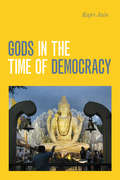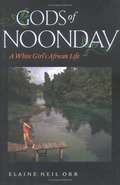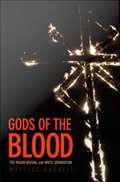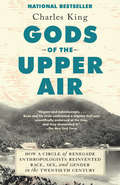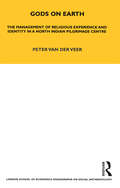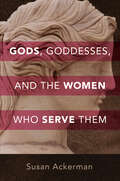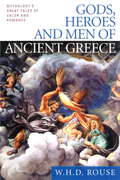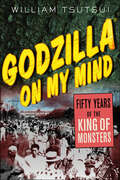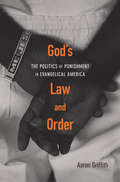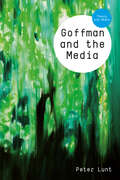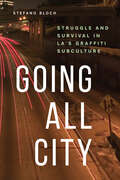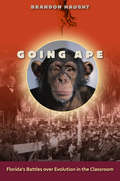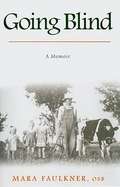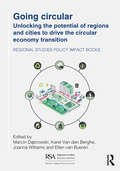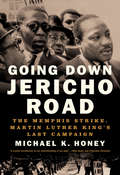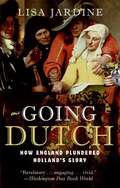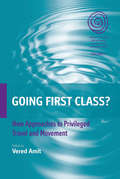- Table View
- List View
Gods in the Time of Democracy
by Kajri JainIn 2018 India's prime minister, Narendra Modi, inaugurated the world's tallest statue: a 597-foot figure of nationalist leader Sardar Patel. Twice the height of the Statue of Liberty, it is but one of many massive statues built following India's economic reforms of the 1990s. In Gods in the Time of Democracy Kajri Jain examines how monumental icons emerged as a religious and political form in contemporary India, mobilizing the concept of emergence toward a radical treatment of art historical objects as dynamic assemblages. Drawing on a decade of fieldwork at giant statue sites in India and its diaspora and interviews with sculptors, patrons, and visitors, Jain masterfully describes how public icons materialize the intersections between new image technologies, neospiritual religious movements, Hindu nationalist politics, globalization, and Dalit-Bahujan verifications of equality and presence. Centering the ex-colony in rethinking key concepts of the image, Jain demonstrates how these new aesthetic forms entail a simultaneously religious and political retooling of the “infrastructures of the sensible.”
Gods of Noonday: A White Girl's African Life
by Elaine Neil OrrOrr (contemporary literature, women's studies, North Carolina State U.) sensitively depicts growing up in pre-independence Nigeria as the child of American medical missionary parents. Returning to Africa helps restore her health and sense of identity. Annotation ©2004 Book News, Inc., Portland, OR (booknews.com)
Gods of the Ancient World: A Kids’ Guide to Ancient Mythologies
by Marchella WardUncover the stories of gods and goddesses from around the world, in this dynamic anthology of ancient myths.Discover 23 captivating stories of gods and goddesses from civilizations around the world in this book that introduces children to ancient cultures with colorful illustrations and incredible storytelling. Young readers will delight in myths that explain the beginning of the world, the way gods helped humans, the divine's power over weather and other natural phenomena, and much more. Gods of the Ancient World is a perfect global introduction to the most fascinating stories about gods and goddesses from ancient history. Further featuring: - The incredible myths and legends behind each god or goddess with real-world art references. - Illustrations bring each god and goddess to life for a young audience.- Fact boxes call out key information to draw the reader in.- A global look at mythologies, with Maya, Japanese and Yoruba deities as well as Ancient Greek and Roman gods.Authored by Classics expert Marchella Ward, a researcher at the University of Oxford, this beautifully illustrated treasury of ancient mythologies is perfect for children age 9-12, with amazing real-life photos of ancient objects which show how people worshipped the gods through art.
Gods of the Blood: The Pagan Revival and White Separatism
by Mattias GardellRacist paganism is a thriving but understudied element of the American religious and cultural landscape. Gods of the Blood is the first in-depth survey of the people, ideologies, and practices that make up this fragmented yet increasingly radical and militant milieu. Over a five-year period during the 1990s Mattias Gardell observed and participated in pagan ceremonies and interviewed pagan activists across the United States. His unprecedented entree into this previously obscure realm is the basis for this firsthand account of the proliferating web of organizations and belief systems combining pre-Christian pagan mythologies with Aryan separatism. Gardell outlines the historical development of the different strands of racist paganism--including Wotanism, Odinism and Darkside Asatr--and situates them on the spectrum of pagan belief ranging from Wicca and goddess worship to Satanism. Gods of the Blood details the trends that have converged to fuel militant paganism in the United States: anti-government sentiments inflamed by such events as Ruby Ridge and Waco, the rise of the white power music industry (including whitenoise, dark ambient, and hatecore), the extraordinary reach of modern communications technologies, and feelings of economic and cultural marginalization in the face of globalization and increasing racial and ethnic diversity of the American population. Gardell elucidates how racist pagan beliefs are formed out of various combinations of conspiracy theories, anti-Semitism, warrior ideology, populism, beliefs in racial separatism, Klandom, skinhead culture, and tenets of national socialism. He shows how these convictions are further animated by an array of thought selectively derived from thinkers including Nietzche, historian Oswald Spengler, Carl Jung, and racist mystics. Scrupulously attentive to the complexities of racist paganism as it is lived and practiced, Gods of the Blood is a fascinating, disturbing, and important portrait of the virulent undercurrents of certain kinds of violence in America today.
Gods of the Hammer: The Teenage Head Story (Exploded Views)
by Geoff Pevere'Teenage Head changed the face of music in this country. I would not be who I am today without their first record ... In 1979 they were the only band that mattered.' - Hugh Dillon In the late 1970s and early 1980s, no Canadian band rocked harder, louder or to more hardcore fans than Hamilton, Ontario's own Teenage Head. Although usually lumped in the dubiously inevitable 'punk rock' category of the day, this high--energy quartet --consisting of four guys who'd known each other since high school --were really only punk by association. In essence they were a full--on, balls--to--the--wall, three--chord, kick--out--the--jams band that obliterated categories and labels with the sheer force of their sonic assault, and everywhere they played they converted the merely curious to the insanely devoted. And they almost became world famous. Almost. This is their story, told in full and for the first time, and by those who lived to tell the tale. Praise for Gods of the Hammer: 'A riot of a good read on Teenage Head ... the writing is fast-paced and lively, told from the laudatory perspective of a frustrated fan trying to explain why such a great band never got its due.' - The Hamilton Spectator 'I loved it! Wanted it to last forever! Geoff Pevere has done an ace portrait of all that is great and dirty in rock and roll.' - Bruce McDonald 'Pevere's is an on-the-ground fan's account of how the band enamoured a country and how if just that one last, special piece fell into place -- if they were managed better, if an American record deal came sooner, if guitarist Gord Lewis hadn't been laid up for half a year at their very peak by a back-breaking car accident -- songs like "Picture My Face" and "Let's Shake" would be played before face-offs and stocked in jukeboxes from St. John's to San Francisco. The Head were always just a centimetre away from super-stardom. To a generation of hip music fans, they're as classic as The Cars, but instead of ubiquity, their story is a distinctly Canadian Almost Famous.' - Chart Attack Praise for Geoff Pevere: 'After almost 30 years of writing about the movies, Geoff Pevere's anti-establishment views are just as strong as ever, but now he wears them as comfortably as an old leather jacket. He has always been more interested in broadening people's interests than in trying to narrow them. In an age with almost unlimited access to film, just one stream in an onrushing tide of media, this is daring. For the boy who once had to wait months to see Citizen Kane, however, it's simply a gesture of generosity.' -- Toronto Screen Shot
Gods of the Runes: The Divine Shapers of Fate
by Frank Joseph Ian DanielsThe ancient origins and divinatory power of the runes • Uncovers the original divinatory meaning of each rune through the myths of its corresponding Norse god or goddess • Includes beautiful full-color illustrations of the runic gods and goddesses • Presents rune-casting spreads for divination and character analysis • Explores the controversial history of runes from the Paleolithic Stone Age to today Invented long before the appearance of the runic alphabet Futhark less than two thousand years ago, the runes were originally created as symbols for specific deities. Representing the twenty-four Norse gods and goddesses from the Vanir and Aesir pantheons, the runes provide a way to establish direct contact with the divine shapers of fate. Based on the work of Austrian mystic and runologist Guido von List and anthropologist Marija Gimbutas as well as the oldest rune artifacts to survive from pre-Christian Europe, this book reveals the long history of runes from their appearances in Paleolithic cave paintings through their rechristening in Medieval times to their modern resurgence as a popular tool of divination. It uncovers the original names and divinatory meanings of each rune by exploring the myths, personality traits, astrological periods, identifying colors, and gemstones of the rune’s corresponding god or goddess. It also illustrates and explains five ancient rune-casting spreads used by Norse adepts for divination as well as character analysis. By renewing their link with the divine, Gods of the Runes shows how working with the runes can be a genuine mystical experience, enabling a personal connection with the gods and a rediscovery of their perennial truths.
Gods of the Upper Air: How a Circle of Renegade Anthropologists Reinvented Race, Sex, and Gender in the Twentieth Century
by Charles KingNEW YORK TIMES BESTSELLER2020 Anisfield-Wolf Book Award WinnerFinalist for the National Book Critics Circle AwardFrom an award-winning historian comes a dazzling history of the birth of cultural anthropology and the adventurous scientists who pioneered it—a sweeping chronicle of discovery and the fascinating origin story of our multicultural world.A century ago, everyone knew that people were fated by their race, sex, and nationality to be more or less intelligent, nurturing, or warlike. But Columbia University professor Franz Boas looked at the data and decided everyone was wrong. Racial categories, he insisted, were biological fictions. Cultures did not come in neat packages labeled "primitive" or "advanced." What counted as a family, a good meal, or even common sense was a product of history and circumstance, not of nature. In Gods of the Upper Air, a masterful narrative history of radical ideas and passionate lives, Charles King shows how these intuitions led to a fundamental reimagining of human diversity. Boas's students were some of the century's most colorful figures and unsung visionaries: Margaret Mead, the outspoken field researcher whose Coming of Age in Samoa is among the most widely read works of social science of all time; Ruth Benedict, the great love of Mead's life, whose research shaped post-Second World War Japan; Ella Deloria, the Dakota Sioux activist who preserved the traditions of Native Americans on the Great Plains; and Zora Neale Hurston, whose studies under Boas fed directly into her now classic novel, Their Eyes Were Watching God. Together, they mapped civilizations from the American South to the South Pacific and from Caribbean islands to Manhattan's city streets, and unearthed an essential fact buried by centuries of prejudice: that humanity is an undivided whole. Their revolutionary findings would go on to inspire the fluid conceptions of identity we know today. Rich in drama, conflict, friendship, and love, Gods of the Upper Air is a brilliant and groundbreaking history of American progress and the opening of the modern mind.
Gods on Earth: The Management of Religious Experience and Identity in a North Indian Pilgrimage Centre (LSE Monographs on Social Anthropology #59)
by Peter van der VeerThis book is the result of the long interest in Hindu pilgrimage which was encouraged during his study of Sanskrit and Hinduism It provided a detailed historical anthropology of Ayodhya, which argues that religious values can reflect political and economic processes. This is Volume 59 of the London School of Economics Monographs on Social Anthropology.
Gods, Goddesses, and the Women Who Serve Them
by Susan AckermanA wide-ranging study of women in ancient Israelite religion. Susan Ackerman has spent her scholarly career researching underexamined aspects of the world of the Hebrew Bible—particularly those aspects pertaining to women. In this collection drawn from three decades of her work, she describes in fascinating detail the worship of goddesses in ancient Israel, the roles women played as priests and prophets, the cultic significance of queen mothers, and the Hebrew Bible&’s accounts of women&’s religious lives. Specific topics include:the &“Queen of Heaven,&” a goddess whose worship was the object of censure in the book of JeremiahAsherah, the great Canaanite mother goddess for whom Judean women were described as weaving in the book of Kingsbiblical figures considered as religious functionaries, such as Miriam, Deborah, and Zipporahthe lack of women priests in ancient Israel explored against the prevalence of priestesses in the larger ancient Near Eastern worldthe cultic significance of queen mothers in Israel and throughout the ancient Near EastIsraelite women&’s participation in the cult of Yahweh and in the cults of various goddesses
Gods, Graves & Scholars: The Story of Archaeology
by C. W. CeramC.W. Ceram visualized archeology as a wonderful combination of high adventure, romance, history and scholarship, and this book, a chronicle of man's search for his past, reads like a dramatic narrative. We travel with Heinrich Schliemann as, defying the ridicule of the learned world, he actually unearths the remains of the ancient city of Troy. We share the excitement of Lord Carnarvon and Howard Carter as they first glimpse the riches of Tutankhamen's tomb, of George Smith when he found the ancient clay tablets that contained the records of the Biblical Flood. We rediscover the ruined splendors of the Hanging Gardens of Babylon, one of the wonders of the ancient wold; of Chichen Itza, the abandoned pyramids of the Maya: and the legendary Labyrinth of tile Minotaur in Crete. Here is much of the history of civilization and the stories of the men who rediscovered it.From the Paperback edition.
Gods, Heroes and Men of Ancient Greece
by W. H. RouseThe Adventures that Shaped the Western World First published in 1934, Gods, Heroes and Men of Ancient Greece has become one of the most popular, enduring--and captivating--retellings of the ancient myths for modern readers. Recognizing the sheer entertainment value of these timeless adventures, world renowned classical scholar W.H.D. Rouse delighted his students at the Perse School in Cambridge, England, with a conversational style and childlike wonder that made the legends come alive--a rare storytelling gift that continues to engage young and old alike. Many of the characters in this book are familiar to us--Helen of Troy, Icarus, Zeus, Athena, to name just a few--but rarely have their stories of war and adventure, bravery and romance, been so simply and thrillingly told. From the strong-arm heroics of Heracles, to the trickery of the Trojan Horse, from the seductions of Circe the sorceress, to the terrors of the Cyclops and Minotaur, these legends have outlived the culture that bore them. But while the ancient Greeks may be long gone, their fables and morals, their heroes and heroines, live on today...
Gods, Heroes and Men of Ancient Greece: Mythology's Great Tales of Valor and Romance
by W. H. D. RouseThe Adventures that Shaped the Western World First published in 1934, Gods, Heroes and Men of Ancient Greece has become one of the most popular, enduring--and captivating--retellings of the ancient myths for modern readers. Recognizing the sheer entertainment value of these timeless adventures, world renowned classical scholar W. H. D. Rouse delighted his students at the Perse School in Cambridge, England, with a conversational style and childlike wonder that made the legends come alive--a rare storytelling gift that continues to engage young and old alike. Many of the characters in this book are familiar to us--Helen of Troy, Icarus, Zeus, Athena, to name just a few--but rarely have their stories of war and adventure, bravery and romance, been so simply and thrillingly told. From the strong-arm heroics of Heracles, to the trickery of the Trojan Horse, from the seductions of Circe the sorceress, to the terrors of the Cyclops and Minotaur, these legends have outlived the culture that bore them. But while the ancient Greeks may be long gone, their fables and morals, their heroes and heroines, live on today hellip;
Godzilla on My Mind: Fifty Years of the King of Monsters
by William TsutsuiThis year, to mark the fiftieth anniversary of his first appearance on the screen, the original, uncut version of Godzilla was released in American theaters to the delight of Sci-Fi and B-Movie fans everywhere. Ever since Godzilla (or, Gojira, as he is known in Japan) crawled out of his radioactive birthplace to cut a swath of destruction through Tokyo, he has claimed a place alongside King Kong and others in the movie monster pantheon. He is the third most recognizable Japanese celebrity in the United States, and his fan base continues to grow as children today prove his enduring appeal. Now, Bill Tsutsui, a life-long fan and historian, takes a light-hearted look at the big, green, radioactive lizard, revealing how he was born and how he became a megastar. With humorous anecdotes, Godzilla on My Mind explores his lasting cultural impact on the world. This book is sure to be welcomed by pop culture enthusiasts, fans, and historians alike.
God’s Law and Order: The Politics Of Punishment In Evangelical America
by Aaron GriffithAn incisive look at how evangelical Christians shaped—and were shaped by—the American criminal justice system.America incarcerates on a massive scale. Despite recent reforms, the United States locks up large numbers of people—disproportionately poor and nonwhite—for long periods and offers little opportunity for restoration. Aaron Griffith reveals a key component in the origins of American mass incarceration: evangelical Christianity.Evangelicals in the postwar era made crime concern a major religious issue and found new platforms for shaping public life through punitive politics. Religious leaders like Billy Graham and David Wilkerson mobilized fears of lawbreaking and concern for offenders to sharpen appeals for Christian conversion, setting the stage for evangelicals who began advocating tough-on-crime politics in the 1960s. Building on religious campaigns for public safety earlier in the twentieth century, some preachers and politicians pushed for “law and order,” urging support for harsh sentences and expanded policing. Other evangelicals saw crime as a missionary opportunity, launching innovative ministries that reshaped the practice of religion in prisons. From the 1980s on, evangelicals were instrumental in popularizing criminal justice reform, making it a central cause in the compassionate conservative movement. At every stage in their work, evangelicals framed their efforts as colorblind, which only masked racial inequality in incarceration and delayed real change.Today evangelicals play an ambiguous role in reform, pressing for reduced imprisonment while backing law-and-order politicians. God’s Law and Order shows that we cannot understand the criminal justice system without accounting for evangelicalism’s impact on its historical development.
Goethe in the Age of Artificial Intelligence: Enlightened Solutions for a Modern Hubris
by Malte EbachInside you lies a precise scientific instrument – the ability to observe Nature and recall past experiences. You were born with it and you use it every day. You can be trained to use it more effectively to, for example, compare and discover new species of organisms or new minerals. Our senses do have limitations, and we often use microscopes, telescopes and other tools to aid our observation. However, we benefit from knowing their limitations and the impact they have on our ability to combine our observations and our experience to make decisions. Once these tools replace our direct observation and our experience we ourselves become disconnected from Nature. Scientific practice turns into well-meant opinions out-weighing empirical evidence. This is happening now in the current age of big data and artificial intelligence. The author calls this the Modern Hubris and it is slowly corroding science. To combat the Modern Hubris and to reconnect with Nature, scientists need to change the way they practise observation. To do so may require the scientist to transform themself. One person who successfully did this was Johann Wolfgang von Goethe. His journey demonstrates how one man attempted to take on the Modern Hubris by transforming his life and how he saw Nature. Following Goethe’s transformation teaches us how we can also reconnect ourselves with Nature and Natural science.
Goffman and the Media (Theory and Media)
by Peter LuntErving Goffman’s much-loved works are widely cited in media and communication studies. His books have stimulated research on news framing, mass media and social media, inviting new insights about how communication, self, audiences and public life are mediated by, but also transcend, particular technological forms. What explains the continuing relevance of this highly original theorist? In this book, Peter Lunt critically examines how and why the concepts developed by Goffman – face-work and the mediated self, frontstage and backstage, impression management, media frames and logics, footing and interaction rituals – still resonate across the field. Ultimately, Goffman’s sociology emerges not only as an enduring influence, but as a source of new inspiration in our ever more interactive world. Original and incisive, Goffman and the Media is crucial reading for students and scholars encountering this fascinating thinker from a media studies perspective.
Goffman-Handbuch: Leben – Werk – Wirkung
by Robert Hettlage Karl LenzErving Goffman (1922–1982) ist ein soziologischer Klassiker der zweiten Generation. In seinem Theorie- und Forschungsprogramm geht es vor allem um wiederkehrende Ordnungsmuster (Strukturen) in alltäglichen Begegnungssituationen. Viele von ihm geprägte Begriffe (Eindrucksmanagement, totale Institutionen, Stigma, Rollendistanz u.a.) gehören heute zum Standardrepertoire der Soziologie. Seine Bücher liegen in hohen Auflagen und zahlreichen Übersetzungen vor, die weit über die Fachgrenzen hinaus rezipiert werden. Das Handbuch erörtert die theoretischen Kontexte seines Werkes, stellt seine wichtigsten Publikationen und Grundbegriffe vor. Es bietet zudem einen umfassenden Überblick über die vielfältige Rezeptionsgeschichte seiner Arbeiten.
Gogo Breeze: Zambia’s Radio Elder and the Voices of Free Speech
by Harri EnglundWhen Breeze FM, a radio station in the provincial Zambian town of Chipata, hired an elderly retired schoolteacher in 2003, no one anticipated the skyrocketing success that would follow. A self-styled grandfather on air, Gogo Breeze seeks intimacy over the airwaves and dispenses advice on a wide variety of grievances and transgressions. Multiple voices are broadcast and juxtaposed through call-ins and dialogue, but free speech finds its ally in the radio elder who, by allowing people to be heard and supporting their claims, reminds authorities of their obligations toward the disaffected. Harri Englund provides a masterfully detailed study of this popular radio personality that addresses broad questions of free speech in Zambia and beyond. By drawing on ethnographic insights into political communication, Englund presents multivocal morality as an alternative to dominant Euro-American perspectives, displacing the simplistic notion of voice as individual personal property—an idea common in both policy and activist rhetoric. Instead, Englund focuses on the creativity and polyphony of Zambian radio while raising important questions about hierarchy, elderhood, and ethics in the public sphere. A lively, engaging portrait of an extraordinary personality, Gogo Breeze will interest Africanists, scholars of radio and mass media, and anyone interested in the history and future of free speech.
Going All City: Struggle and Survival in LA's Graffiti Subculture
by Stefano BlochA graffiti writer’s memoir: “A brave portrait of a highly criticized subculture and a look inside the reality of growing up in low-income Los Angeles.” —LA Weekly“We could have been called a lot of things: brazen vandals, scared kids, threats to social order, self-obsessed egomaniacs, marginalized youth, outsider artists, trend setters, and thrill seekers. But, to me, we were just regular kids growing up hard in America and making the city our own. Being ‘writers’ gave us something to live for and ‘going all city’ gave us something to strive for; and for some of my friends it was something to die for.”In the age of commissioned wall murals and trendy street art, it’s easy to forget graffiti’s complicated and often violent past in the United States. Though graffiti has become one of the most influential art forms of the twenty-first century, cities nationwide waged a war against it from the late 1970s to the early 2000s, complete with brutal police task forces. Who were the vilified taggers they targeted? Teenagers, usually, from low-income neighborhoods with little to their names except a few spray cans and a desperate need to be seen—to mark their presence on city walls and buildings even as their cities turned a blind eye to them.Going All City is the mesmerizing and painful story of these young graffiti writers, told by one of their own. Prolific LA writer Stefano Bloch came of age in the late 1990s amid constant violence, poverty, and vulnerability. He recounts vicious interactions with police; debating whether to take friends with gunshot wounds to the hospital; coping with his mother’s heroin addiction; instability and homelessness; and his dread that his stepfather would get out of jail and tip his unstable life into full-blown chaos. But he also recalls moments of peace and exhilaration: marking a fresh tag; the thrill of running with his crew at night; exploring the secret landscape of LA; the dream and success of going all city.Bloch holds nothing back in this fierce, poignant memoir—an unflinching portrait of a deeply maligned subculture and an unforgettable account of what writing on city walls means to the most vulnerable people living within them.
Going Ape: Florida's Battles over Evolution in the Classroom
by Brandon HaughtBefore William Jennings Bryan successfully prosecuted John Scopes in the infamous “Scopes Monkey Trial,” he was a prominent antievolution agitator in Florida.In Going Ape, Brandon Haught tells the riveting story of how the war over teaching evolution began and unfolded in Florida, one of the nation’s bellwether states. It still simmers just below the surface, waiting for the right moment to engulf the state.The saga opens with the first shouts of religious persecution and child endangerment in 1923 Tallahassee and continues today with forced delays and extra public hearings in state-level textbook adoptions. These ceaseless battles feature some of the most colorful culture warriors imaginable: a real estate tycoon throwing his fortune into campaigns in Miami; lawmakers attempting to insert the mandatory teaching of creationism into bills; and pastors and school board members squabbling in front of the national media that descends into their small town. The majority of participants, however, have been, and still are, average people, and Haught expertly portrays these passionate citizens and the sense of moral duty that drives each of them.Given a social climate where the teaching of evolution continues to sharply divide neighbors and communities, Going Ape is a must-read for anyone concerned with the future of public education.
Going Blind: A Memoir
by Mara Faulkner<P>Mara Faulkner grew up in a family shaped by Irish ancestry, a close-to-the-bone existence in rural North Dakota, and the secret of her father's blindness--along with the silence and shame surrounding it. Dennis Faulkner had retinitis pigmentosa, a genetic disease that gradually blinded him and one that may blind many members of his family, including the author. <P>Moving and insightful, Going Blind explores blindness in its many Permutations-within the context of the author's family, more broadly, as a disability marked by misconceptions, and as a widely used cultural metaphor. Mara Faulkner delicately weaves her family's story into an analysis of the roots and ramifications of the various metaphorical meanings of blindness, touching of the Catholic Church of the 1940s, and 1950s, Japanese internment, the Germans from Russia who dominated her hometown, and the experiences of Native people in North Dakota. <P>Neither sentimental nor dispassionate, the author asks whether it's possible to find gifts when sight is lost.
Going Circular: Unlocking the potential of regions and cities to drive the circular economy transition (Regional Studies Policy Impact Books)
by Joanna Williams Marcin Dąbrowski Karel Van den Berghe Ellen Van BuerenGoing Circular explores the concept of a circular economy (CE) and its transformative potential for cities and regions. It emphasises the importance of spatial planning and the role of urban and regional authorities in driving the transition to a more sustainable, resilient and inclusive economic and societal model. The authors offer a critical perspective, arguing that there is no onesize-fits-all approach to regional and urban CE policies. Instead, they advocate for a context-specific understanding of CE, emphasising the importance of: local and regional conditions for circular activities; the spatial patterns in resource stocks and flows within territories, and the need to engage a range of stakeholders and communities in decision-making processes.Going Circular tackles the pivotal policy issues and challenges related to CE transitions in cities and regions. It will inform and equip public and private policymakers, urban planners and regional authorities with the knowledge and tools needed to foster a CE and nudge cities and regions towards sustainable futures.Despite extensive data and knowledge available on cities and regions, terms such as ‘circularity’, ‘economy’ and ‘space’ often remain disjointed for researchers, policymakers and practitioners alike. This book presents a frank and insightful exploration of the spatial dimension of the circular economy, challenging assumptions and idealisms. It provides practical opportunities for action by underscoring the importance of geopolitics, empathy and justice, ecosystems restoration, and assessment of progress on the transition pathways towards a circular economy. The book equips readers with language and visual concepts needed to engage with and communicate this topic confidently. I highly recommend it as both an introduction and a refresher on the topic of circular regions and cities.Adrian Vickery Hill, Strategist and designer - director, Osmos NetworkThis book outlines a path to trigger circular economy processes that can transform cities and regions, guiding them towards a more resilient and sustainable future, while producing context-appropriate solutions. Circular economy is a context-specific, place-based process that requires a holistic and systemic perspective, in which space plays a crucial role. In six thematic chapters, the book proposes a pathway analysing several key issues: the spatial dimension of circular economy; the opportunities for more ecologically healthy, resource-sufficient metropolitan regions; the integration of social justice and the concept of “care-full” circular economy; the ecological implications of the transition in line with the urban circular bioeconomy; the multidimensional assessment of the transition progress and cross-level interdependencies; as well as policy recommendations for multi-level governance at various scales. This book provides an inspiring perspective on circular economy, not only as a technical and economic challenge, but also as a social and political opportunity. It is highly recommended for anyone interested in fostering a more sustainable and circular future for our cities.Prof. Maria Cerreta, University of Naples “Federico II”
Going Down Jericho Road: The Memphis Strike, Martin Luther King's Last Campaign
by Michael K. HoneyThe definitive history of the epic struggle for economic justice that became Martin Luther King Jr.'s last crusade. Memphis in 1968 was ruled by a paternalistic "plantation mentality" embodied in its good-old-boy mayor, Henry Loeb. Wretched conditions, abusive white supervisors, poor education, and low wages locked most black workers into poverty. Then two sanitation workers were chewed up like garbage in the back of a faulty truck, igniting a public employee strike that brought to a boil long-simmering issues of racial injustice. With novelistic drama and rich scholarly detail, Michael Honey brings to life the magnetic characters who clashed on the Memphis battlefield: stalwart black workers; fiery black ministers; volatile, young, black-power advocates; idealistic organizers and tough-talking unionists; the first black members of the Memphis city council; the white upper crust who sought to prevent change or conflagration; and, finally, the magisterial Martin Luther King Jr., undertaking a Poor People's Campaign at the crossroads of his life, vilified as a subversive, hounded by the FBI, and seeing in the working poor of Memphis his hopes for a better America.
Going Dutch: How England Plundered Holland's Glory
by Lisa JardineOn November 5, 1688, William of Orange, Protestant ruler of the Dutch Republic, landed at Torbay in Devon with a force of twenty thousand men. Five months later, William and his wife, Mary, were jointly crowned king and queen after forcing James II to abdicate. Yet why has history recorded this bloodless coup as an internal Glorious Revolution rather than what it truly was: a full-scale invasion and conquest by a foreign nation?The remarkable story of the relationship between two of Europe's most important colonial powers at the dawn of the modern age, Lisa Jardine's Going Dutch demonstrates through compelling new research in political and social history how Dutch tolerance, resourcefulness, and commercial acumen had effectively conquered Britain long before William and his English wife arrived in London.
Going First Class?
by Vered AmitPeople travel as never before. However, anthropological research has tended to focus primarily on either labor migration or on tourism. In contrast, this collection of essays explores a diversity of circumstances and impetuses towards contemporary mobility. It ranges from expatriates to peripatetic professionals to middle class migrants in search of extended educational and career opportunities to people seeking self development through travel, either by moving after retirement or visiting educational retreats. These situations, however, converge in the significant resources, variously of finances, time, credentials or skills, which these voyagers are able to call on in embarking on their respective journeys. Accordingly, this volume seeks to tease out the scope and implications of the relatively privileged circumstances under which these voyages are being undertaken.
